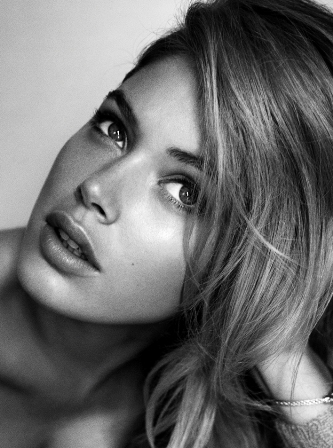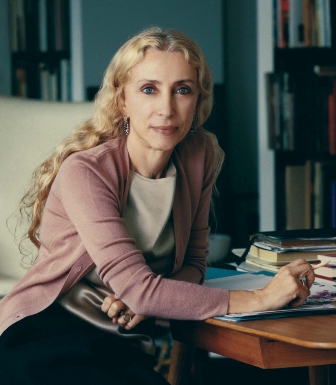When I read who was coming to Harvard's public forum, "Health Is Beauty: Defining Ourselves," I knew I was going. The Harris Center's 15th annual forum offered a rare insider's view of an issue near and dear my professional heart -- body image and the media.
Just about every client on my caseload struggles with body image, so I was eager to hear what Victoria's Secret model Doutzen Kroes and Vogue Italia editor Franca Sozzani had to say about the relationship between bad body image and eating disorders.
For those who aren't up on fashion, the outspoken Sozzani has made headline news by advocating for health and beauty at every size. Most notably, she put "curvy" models on the cover of Vogue Italia last year. More recently, she's been getting good press for taking political action against pro-ana and pro-mia websites (sites that actively encourage anorexia and bulimia). You don't have to know your supermodels, however, to recognize Kroes as that underwear model currently smiling down on New York City from a 34th Street billboard.
So I went, I heard; and fortunately, I had time to sit down with Kroes and Sozzani and talk personally about their professional quest to help all women feel better about their bodies. What follows are questions and answers from our recent heart-to-heart. Just so you know: neither Kroes nor Sozzani is a native English speaker. Rather than edit their grammar, I've left their poetic grammatical constructions as is.
Holland-born Doutzen Kroes has made her name modeling for Victoria's Secret and Vogue.

Q. Given your line of work, you're an unlikely spokesperson for body image issues. What moved you to speak out?
A. I myself never experienced any eating disorder, but was told to lose weight many times. For me it was important to stand up and say: "I can't lose more weight and be healthy. This is it. This is what you get." Luckily, I come from Holland and I have a really great background -- great parents and a solid childhood. I knew I could always go home if I didn't make it in the fashion industry. I don't think lots of girls have that. I feel I need to stand up and change the rules. Maybe get the minimum age [for modeling] up to 16. Because sometimes the girls are 13 or 14. That's too young!
Q. Why do you think body image issues have come to plague so many women, especially here in America?
A. Back in the day, there was only Marilyn Monroe and a few others on posters that people compared themselves to. Now everyone feels like they can become a model and become famous. That's what makes it more of a problem. People have to accept that not everyone can be a model. But it's difficult because we get pressure as girls to be beautiful and thin. It's really strange because we don't get pressure to be scientists or athletes. In fashion, pictures are retouched, but, you know, we all have flaws.
Q. Given my line of work -- as a psychotherapist specializing in eating issues -- it's clear that most women struggle with some aspect of their appearance. How about you? What can you say about your own struggles past or present?
A. I never say. If I say it, people focus on it. Even my husband doesn't know. I think it's good to be married, but you still have these mysteries. I'm not going to share because then he see it. I have flaws, but I get to the set and they make me feel beautiful. I feel lucky that I have that. I have my family. I'm happy. I'm doing what I do. I'm 27 and had baby last year. After that, some mental thing changed about weight. I totally let go. I feel better than ever, the best I can be. I think women have to accept their body, but be the best they can be. If you work out, eat healthy and you're happy. That's all that matters.
Q. What's your best suggestion for stopping the madness -- the punishing diet and exercise plans, the eating disorders, the unnecessary plastic surgery?
A. It's like where do you start? Being here [at Harvard's public form] is a small thing, but it does make a difference. We can reach as many as we can today. Also, it's important to accept those images [of models in the media] are a fantasy. It's our job to work out every day and to look our best. It's difficult because women probably feel the pressure toward men. They think they have to look like that because guys see it and that's what their girlfriend is supposed to look like. Then there are beautiful girls in school and you're not [as beautiful] and that makes it harder. I think you have to get your happiness from different things than your looks. Beauty doesn't last. If you go to school, or do sports, or whatever makes you happy, that lasts longer than beauty.
Q. How do you suggest women go easier on their bodies, themselves?
A. Women are so mean to each other, but there's no reason for competition. If I were to compare myself to the other girls, I'd go crazy. I say that as a model. Everybody does it. Every woman looks at her own insecurities and compares herself with someone else. I do that, too, but it makes it a little bit more difficult. Everyone has their doubts and insecurities. I get a picture taken and I don't look the same in the picture as in real life. I look in mirror at home, everything looks very different. I have the same struggles.
Italy-born Franca Sozzani has made her name as long-time Vogue Italia editor.

Q. Given your line of work, you're an unlikely spokesperson for body image issues. What moved you to speak out?
A. Because I'm a part of this work, I know the good and the bad. I spoke knowing well that this was a boomerang coming back at me. That everyone would start to say, "Shame on you. You are a hypocrite person. We will never buy any more of your magazines." I did it [spoke out] two different ways. The first time, it was a petition against the websites for pro-ana and pro-mia. I was so upset when I found there are 300,000 websites all around the world. Now we have 12,000 people [names on the petition], but it's not good enough because the websites are exactly the same kinds of websites as pedophilia. I don't see any difference. My idea was to obscure this kind of website, but there is no law that can do it because the server is a machine and it cannot be sued.
At a certain moment, I decided to do another story [something else]. We have 1,800,000 unique users for Vogue Italia. If everybody will open a blog against these websites, we could become much stronger than these people. On the 6th of April, we launched "My Own Blog Against Anorexia and Bulimia." From this moment, young people can talk with young people. Because the most important part is these people [with eating disorders] feel alone. I'm not a doctor, so I cannot do anything. But even as an editor, I know if Vogue would do a blog, it would not be reliable. But if I put young people in connection so they can talk to each other, they will make community without us.
Q. Why do you think body image issues have come to plague so many women, especially here in America?
A. What's happened [with fashion], they started to choose girls they all look the same. They're tall, blonde hair, blue eyes. You couldn't recognize one from the other one. I think it's a mistake to think there's only one prototype of beauty. Of course it's a mistake if a girl takes drugs or if she gets anorexic. That's not the image that fashion wants to give. But why are we presenting all the same kinds of women? If you do not accept that there are different kinds of women, it doesn't give possibility to understand that this is a mistake. To ask me if I feel guilty, I say "no" because in the magazine, we don't use the same models all the times. We have black, Chinese white, big, curvy, old, young. But on the runway they look identical.
What we have is not only to point the finger against fashion, but pharmaceutical, nutrition and aesthetical [cosmetic] industry. Everyone, we should be together. But fashion is on one side. On the other side is the pharmaceutical, [among other industries]. Because how you can go into every drug store and buy pills to lose weight without any prescription. It's not good. I don't think it's normal. Why cream promise you that you can become skinny. Is it correct? No, it doesn't happen. All these kinds of tricks they don't drive you in the right way. They're just tricks to fool you.
Q. Given my line of work -- as a psychotherapist specializing in eating issues -- it's clear that most women struggle with some aspect of their appearance. How about you? What can you say about your own struggles past or present?
A. I like my hair. My hair is part of my brand. I cut it very short because at a certain moment I didn't like. I tried to find my own style, my own way to be. All of us, we have to do. All of us we have a beauty inside. It doesn't matter if it's perfection or not perfection, but we have a part [in finding our own way to be].
Q. What's your best suggestion for stopping the madness -- the punishing diet and exercise plans, the eating disorders, the unnecessary plastic surgery?
A. We only have one thing -- "You look so great because you are so thin." This is mentality that has to change. When we did the curvy girls on the cover [of Vogue Italia], these girls were more than happy to be curvy. They were very satisfied with themselves. They accept themselves because they're beautiful. Their body is sexy, really beautiful. All of us, we should change our mentality. The mentality has to change.
Q. How do you suggest women go easier on their bodies, themselves?
A. I'm not this kind of people who say to accept yourself. You never to accept yourself if you're not happy. Why say "I'm fat, I accept myself." Why? You could have a much better shape. It doesn't mean you have to become anorexic. The goal is to fight, day by day, to arrive where you want to arrive. It doesn't mean to be too skinny or too fat, but feel curvy and sexy and happy. Like Nigella Lawson. I love her. You know, she's sexy and she's beautiful. Can you imagine her skinny? She'd be another person. You are not to be satisfied with what you are because none of us is. You choose better glasses. You choose better hair. You choose a better way to dress. It's too easy to say: "Accept yourself. Be what you are." No I don't want. I want to be better. I have a right to be better. Everybody has a right to be better. This doesn't mean to get sick. This is to be healthy. This is what it means to be beautiful. Because if you're not healthy, you're not beautiful.
To read Sozzani's full speech, click here.
Jean Fain is a Harvard Medical School-affiliated psychotherapist specializing in eating issues, and the author of "The Self-Compassion Diet." For more information, see www.jeanfain.com. Got comments on any of the above? Share your two cents in the Comments section.
For more by Jean Fain, L.I.C.S.W., M.S.W., click here.
For more on eating disorders, click here.